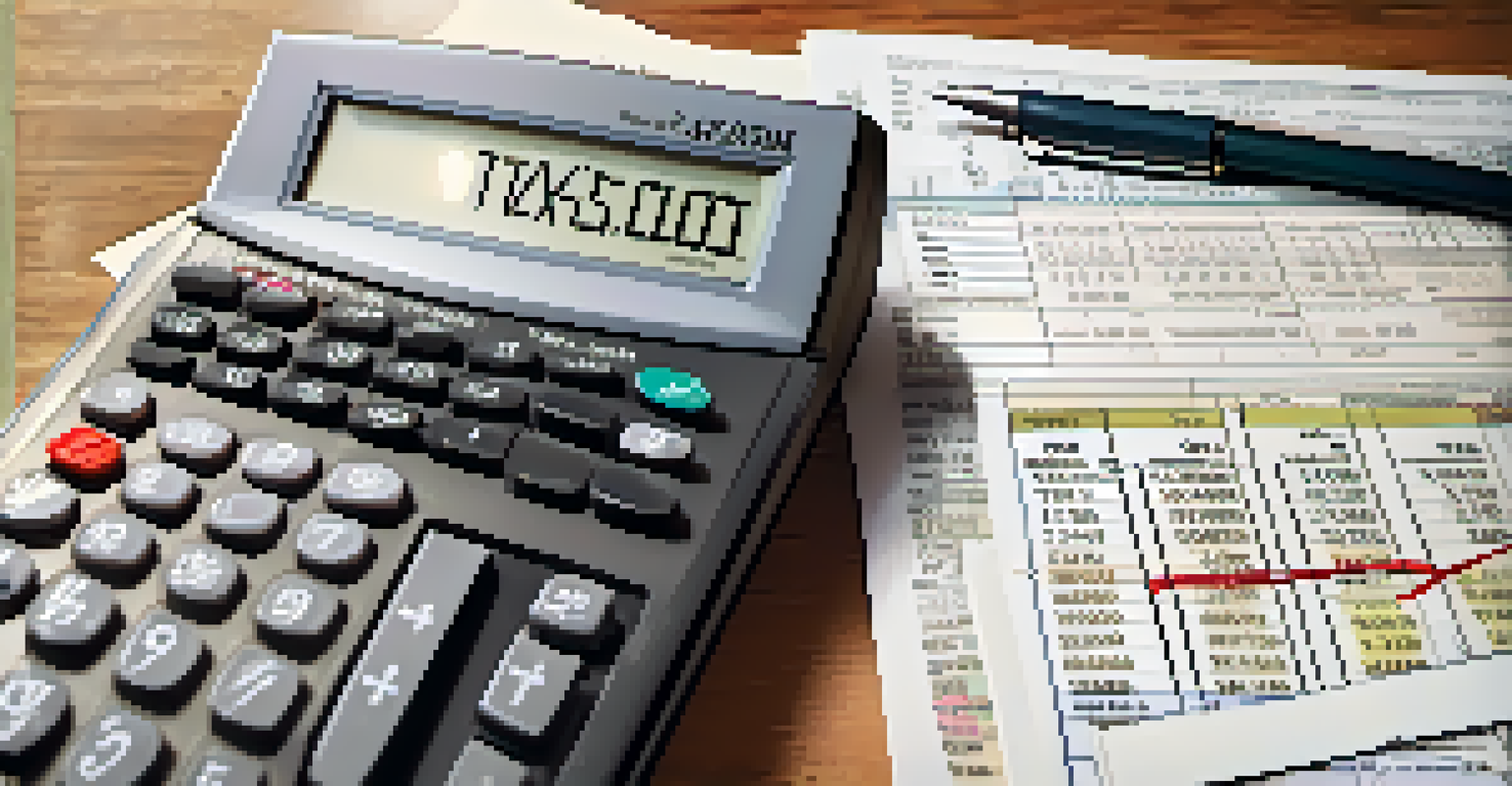Understanding Property Taxes for Homeowners

What Are Property Taxes and Why Do They Matter?
Property taxes are local taxes based on the value of your real estate. They are crucial because they fund essential local services like schools, roads, and emergency services. As a homeowner, understanding these taxes can help you anticipate future costs and budget accordingly.
Taxes are what we pay for civilized society.
These taxes are typically assessed annually, and the amount can vary based on your property's market value and the local tax rate. If your home appreciates in value, your property taxes may increase as well, which can affect your overall financial plan. Being aware of how property taxes work can empower you to make informed decisions about homeownership.
Ultimately, a clear grasp of property taxes helps you not just with budgeting but also with understanding your community's needs and how your contributions are utilized. It’s like being part of a team—your investment supports the well-being of your neighborhood.
How Property Taxes Are Calculated
The calculation of property taxes usually involves two main components: the assessed value of your property and the local tax rate. The assessed value is determined by a local tax assessor who evaluates your home’s worth based on factors like size, location, and condition. This evaluation may happen annually or every few years, depending on local regulations.

After determining the assessed value, the local government applies a tax rate, expressed as a percentage, to come up with your tax bill. For example, if your home is assessed at $200,000 and the tax rate is 1.25%, your property tax would be $2,500 annually. This simple formula can transform into a significant expense, which is why homeowners need to keep a close eye on it.
Understanding Property Taxes
Property taxes fund essential local services and can impact your financial planning as a homeowner.
It’s also important to note that tax rates can change due to various factors such as changes in local government budgets or voter-approved measures. Staying informed about these changes can help you plan for potential increases in your property tax obligations.
Understanding Exemptions and Deductions
Many jurisdictions offer property tax exemptions or deductions that can significantly lower your tax bill. Common exemptions include those for seniors, veterans, and first-time homebuyers, which aim to provide relief to specific groups. Researching what exemptions you might qualify for can lead to substantial savings.
The hardest thing in the world to understand is the income tax.
In some areas, there are also homestead exemptions that reduce the taxable value of your primary residence. This means that if your home is assessed at $250,000 but qualifies for a $50,000 homestead exemption, you would only pay taxes on $200,000. This type of relief is designed to make homeownership more affordable and accessible.
Additionally, keep in mind that applying for these exemptions usually involves a straightforward application process. Don’t miss out on potential savings due to a lack of knowledge—taking the time to understand and apply for these benefits can pay off in the long run.
The Role of Local Governments in Property Taxes
Local governments play a pivotal role in the property tax system, as they set tax rates and determine how taxes are assessed. This means they are responsible for creating budgets that fund local services, which heavily rely on property tax revenue. Understanding this relationship helps homeowners appreciate where their tax dollars go.
Moreover, local governments often hold public hearings and meetings where residents can voice their opinions and stay informed about changes in tax policies. Engaging in these discussions can empower you to have a say in how tax revenues are utilized in your community, making your voice heard.
Calculating Your Property Taxes
Property taxes are calculated based on the assessed value of your home and the local tax rate, which can change over time.
By actively participating in local governance, you not only gain insights into property tax decisions but also contribute to a community-focused approach. It’s about collaboration—working together to ensure that property taxes serve the needs of everyone.
What to Do If You Disagree With Your Property Assessment
If you believe your property assessment is inaccurate, you have the right to appeal the decision. This process typically involves gathering evidence to support your claim, such as recent sales of comparable properties in your area. A well-researched appeal can help you present a compelling case to the local tax authority.
Most jurisdictions have a specific timeline for filing appeals, so it’s crucial to act quickly if you feel your assessment is unfair. Keep in mind that the burden of proof lies with you, meaning you'll need to demonstrate why your property should be assessed at a lower value. This can involve showing discrepancies in the assessment process or highlighting issues that affect your home’s value.
Engaging a real estate professional or tax consultant for assistance can also be beneficial. They can provide valuable insights and help you navigate the complex appeal process while ensuring you present the strongest argument possible.
How Property Taxes Impact Your Mortgage Payments
Understanding how property taxes affect your mortgage payments is crucial for effective budgeting. Most lenders require homeowners to include property taxes in their monthly mortgage payment through an escrow account. This means a portion of your payment goes into this account to cover property taxes when they are due.
If your property taxes increase, your monthly mortgage payment may also rise to accommodate the higher escrow contribution. It’s essential to monitor these changes, as they can affect your overall housing costs. Budgeting for potential tax increases can help you avoid unpleasant surprises down the line.
Managing Property Tax Appeals
Homeowners have the right to appeal property assessments if they believe their home is inaccurately valued.
Additionally, when you first secure a mortgage, lenders typically estimate property taxes based on current rates, but these can change. Being proactive about understanding the relationship between your property taxes and mortgage payments can help you stay financially prepared.
Tips for Managing Property Taxes Effectively
Managing property taxes effectively begins with staying informed about your local tax rates and assessment processes. Regularly reviewing your property tax bill can help you catch any discrepancies early on, allowing you to address issues before they escalate. Knowledge is power—being aware of what you owe and why can help you feel more in control.
Consider setting aside a portion of your budget specifically for property taxes, which can ease the burden when payments come due. This proactive approach ensures that you’re never caught off guard and helps maintain your financial health. Think of it like saving for a rainy day—having a dedicated fund can provide peace of mind.

Lastly, don’t hesitate to engage with local government officials or community groups to advocate for fair property tax policies. Being an active participant in discussions about property taxes can lead to positive changes that benefit all homeowners in your community.